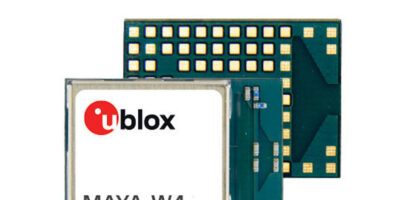u-blox launches tri-radio module that delivers the latest wireless technologies for IoT
u-blox has announced the launch of the MAYA-W4, a tri-radio module that delivers the latest in wireless connectivity technologies for the mass market. With support for dual-band Wi-Fi 6, Bluetooth Low Energy 5.4, and 802.15.4 (for Thread supporting Matter), the MAYA-W4 is set to redefine the landscape of IoT applications in diverse industries, enhancing device connectivity and interoperability.
Combining three of the most critical wireless technologies into a compact, power-efficient module, the versatile MAYA-W4 meets the growing demand for reliable and secure connectivity. Whether enabling low-energy mesh networks for smart homes or providing high-speed Wi-Fi 6 connectivity for industrial tools, the MAYA-W4 offers unparalleled flexibility for developers and manufacturers. Its small size and robust design make it ideal for space-constrained applications, while its comprehensive global certifications ensure seamless deployment across regions.
The MAYA-W4 addresses the market’s need for Wi-Fi 6 solutions, driven by the rapid adoption of Wi-Fi 6 in IoT segments, as highlighted by recent market data from TSR* (Techno Systems Research CO. LTD.). It alleviates network congestion, enhances power efficiency, and, with a temperature range of -40°C to +85°C, is suitable for industrial environments. With its entry-level feature set and optimised data throughput, the MAYA-W4 offers cost-efficient connectivity without compromising performance. The inclusion of 802.15.4 enables low-power IoT and mesh networking, providing a gateway for the next generation of smart, connected devices.
The new module also eases design efforts, enabling manufacturers to scale their device designs for current and future markets. Offering a selection of antenna variants, designers can choose between pin(s) out, embedded antenna, or U.FL. connector(s) configuration. By maintaining the same compact dimensions as its predecessors (10 x 14 x 1.9 mm), u-blox simplifies migration across previous generations.




